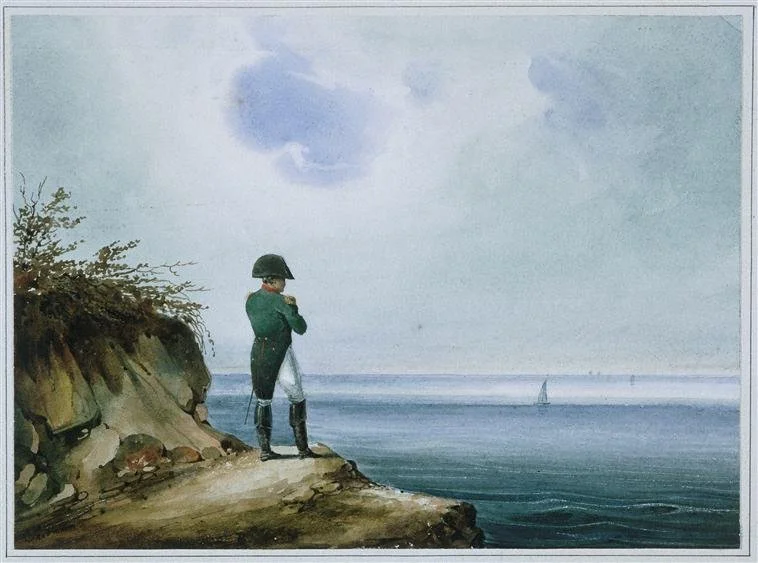Napoleon Bonaparte lost the Battle of Waterloo in 1815, which ultimately led to his departure from France. There was much speculation about where he would end up after leaving France – including the possibility of Napoleon going to America.
Michael Thomas Leibrandt explains.
Napoléon in Sainte-Hélène by František Xaver Sandmann.
I’ve always loved that iconic painting by Jacques-Louis David of Emperor Napoleon on his horse crossing the Alps. It’s not just the beautiful grandeur of his military attire on parade — on his way to a victory at the Battle of Marengo — and ascension from First Consul of France to become Emperor. It’s the boldness of command that he showed as his French Army surprised the Austrian forces under Michael von Melas. This summer season marks 210 years since Napoleon’s final defeat at the Battle of Waterloo.
After crossing the river at Charleroi— Napoleon came between the British and Prussian forces — engaging and defeating Marshal Blucher at Ligny. But when Napoleon was lured into Battle around the village of Waterloo — Lord Wellington’s forces were able to hold out just long enough for the Prussians to arrive. At the end of the Battle — for one of the only times in history — Napoleon’s Old Guard was defeated in combat.
But immediately after vacating the battlefield at Waterloo — Napoleon wanted to continue the war after recently escaping his first exile on the island of Elba and landing once again on French soil. But to the surprise of some — Napoleon didn’t seize power with the shattered remnants of the French Army. Instead — he would abdicate the thrown for the second time on June 22nd after returning to Paris on June 21st.
On June 25th — Napoleon departed the French capital for the last time ever. He would see his mother for the last time in Malmaison — and most ironically would arrive on July 3rd in Rochefort with visions of boarding a ship to America — just hours before the celebration of American Independence from Britain. Napoleon’s plan would be to land somewherebetween Maryland and Virginia. But the French Provisional Government never provided the correct documents and passports.
For the man who had conquered most of Europe at his height of power — America offered the Emperor a new beginning. England had been at war with the United States just three years earlier — which meant that requesting that the American government extradite Napoleon Bonaparte at the Seventh Coalition’s request could be unlikely.
In the end — Napoleon would board a ship. It just wasn’t one bound for America. Instead — Napoleon Bonaparte landed on the island of Aix. He then surrendered to the British Army — and was exiled once again to the island of St. Helena — nearly one thousand miles off the coast of Africa despite his request to retire to the countryside of England. He would arrive on St. Helena in October of 1815 courtesy of the British ship (Northumberland.) He would perish on the island six years later.
With his death — so too faded the attempt of Napoleon to get to American shores. It’s interesting to speculate what it would have meant for Napoleon — Emperor of the French and nearly unbeatable on land — could have given military guidance to the United States Army. Before surrendering to the British — he would proclaim, “I put myself under the protection of their laws; which I claim from your Royal Highness, as the most powerful, the most constant, and the most generous of my enemies.”
Michael Thomas Leibrandt lives and works in Abington Township, PA.







